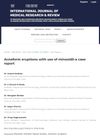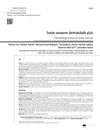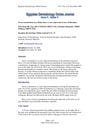 January 2021 in “Journal of Cancer Therapy”
January 2021 in “Journal of Cancer Therapy” Tyrosine Kinase Inhibitors are effective against cancer but can cause skin, digestive, and blood side effects, including hair loss.
7 citations,
April 2006 in “Lasers in medical science” Acneform reactions after laser hair removal occur in 6% of cases, mostly mild and short-lived, with higher risk in younger patients, those treated with Nd:YAG laser, and individuals with darker skin.
 October 2016 in “International journal of medical research and review”
October 2016 in “International journal of medical research and review” Minoxidil, a hair loss treatment, may cause acne-like skin eruptions.
 61 citations,
January 2015 in “Indian Journal of Plastic Surgery”
61 citations,
January 2015 in “Indian Journal of Plastic Surgery” Platelet-rich plasma treatment could potentially be an effective way to treat chronic alopecia areata with minimal side effects.
 36 citations,
May 2011 in “Dermatologic therapy”
36 citations,
May 2011 in “Dermatologic therapy” No treatments fully cure or prevent alopecia areata; some help but have side effects or need more research.
 15 citations,
May 2017 in “Journal of Dermatological Treatment”
15 citations,
May 2017 in “Journal of Dermatological Treatment” Latanoprost works better for hair growth, and combining it with betamethasone valerate is most effective.
 2 citations,
January 2018 in “International journal of research in dermatology”
2 citations,
January 2018 in “International journal of research in dermatology” Intralesional corticosteroids are the best for limited alopecia areata, oral steroids are less effective, and PRP is safe and promising, especially for children and severe cases.
 2 citations,
December 2016 in “Turkderm”
2 citations,
December 2016 in “Turkderm” The study found that many young Syrian refugees have skin infections, especially cutaneous leishmaniasis, and need better health care and living conditions.
 2 citations,
July 2011 in “Journal of the Egyptian Women's Dermatologic Society (Print)”
2 citations,
July 2011 in “Journal of the Egyptian Women's Dermatologic Society (Print)” Eating nuts, chocolate candy, and red tea might worsen acne, while eating more fresh vegetables could reduce it.
 1 citations,
April 2019 in “Advances in Cosmetic Surgery”
1 citations,
April 2019 in “Advances in Cosmetic Surgery” Platelet-rich plasma shows potential for hair growth, but more research is needed to determine the best preparation method.
 1 citations,
January 1980 in “Archives of Dermatology”
1 citations,
January 1980 in “Archives of Dermatology” Syphilis chancres can be atypical, and fiber implantation for baldness is risky and often fails.
 1 citations,
March 1954 in “Archives of dermatology”
1 citations,
March 1954 in “Archives of dermatology” Animal research has greatly advanced dermatology.
 June 2023 in “Revista médica hondureña”
June 2023 in “Revista médica hondureña” Most pediatric cancer patients in the study developed skin problems, often due to their cancer treatment.
 January 2023 in “Rossijskij žurnal kožnyh i veneričeskih boleznej”
January 2023 in “Rossijskij žurnal kožnyh i veneričeskih boleznej” New treatments for child hair loss due to immune issues are effective but not yet officially approved.
67 citations,
July 2011 in “Clinical, cosmetic and investigational dermatology” The document suggests a personalized treatment plan for alopecia areata based on the patient's age and hair loss severity, using a range of therapies ranked by effectiveness and safety.
26 citations,
October 2016 in “American journal of clinical dermatology” New treatments like JAK inhibitors show promise for reversing alopecia areata.
15 citations,
January 2015 in “Dermatitis” Topical immunotherapy is the best treatment for severe alopecia areata.
10 citations,
March 2003 in “Journal of cutaneous medicine and surgery” Alopecia mucinosa can be treated successfully with minocycline.
 January 2023 in “Applied sciences”
January 2023 in “Applied sciences” Gefitinib and Sasam-Kyeongokgo together significantly reduce cancer growth and improve immune response in mice.
 1 citations,
January 2009
1 citations,
January 2009 A 25-year-old Malay fireman had skin bumps on his neck that were removed successfully after other treatments failed.















